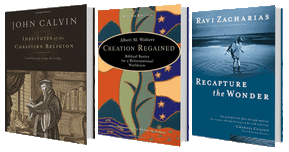One of the important pieces evolving from these conversations is the realization that relationships are integral to effectiveness in Christian school leadership. In fact, the ability to live in and foster positive relationships is integral not only to the effectiveness of the leader, but also for the development of faculty, and the maturity of school community. Let me outline in some detail an overview of thought that has advanced my thinking in this direction over the last decade of my work.
A few years ago I was introduced to the philosophy of intersubjectivity through the educational writings of such authors as Gert Biesta and philosophers such as Martin Buber and Emmanuel Levinas. Crudely, intersubjective thought calls on the individual to live in relationship with others in such a way that the other is treated as a subject rather than an object. In an intersubjective relationship, both parties are responsible for bringing about the subjectivity of the other person – the relationship is reciprocal.
This strikes me as a very Biblical way of thinking about relationships and our part in building Christian community. In an article tackling competition and cooperation in Christian education, Neil Holm drawing heavily on the work of Stephen R. Covey, argues compellingly that Christians should think of this communal orientation as one of interdependence. Along with Covey, he reasons that we can live in one of three orientations towards others: dependent, independent and interdependent. Covey (1989) calls this the ‘Maturity Continuum’. Dependence means we are “directed, nurtured, and sustained by others” (p. 49). During Independence we become “inner-directed and self-reliant” (p. 49). It is only when our orientation becomes one of interdependence when we realize that “the higher reaches of our nature have to do with our relationships with others” (p. 49). In other words, dependence is the paradigm of ‘you’, independence is the paradigm of ‘I’, and interdependence is the paradigm of ‘we’ (p. 49).
So, how does this play out in leadership? The parallels are many, but I would suggest that Christian leaders are not called to treat their ‘subordinates’ as objects, but rather as subjects with whom they are interdependent for growth and flourishing. If a theory must be named to lend credence to this concept, the outline of Relational Leadership Theory by Mary Uhl-Bien (2006) might be a good start. Relational Leadership, she says “breaks down the distinction between leader and follower. It sees leadership not as management, or managers and subordinates, but instead as an interactive process engaged in by participants” (p. 664). This “assumes a relational ontology…all social realities—all knowledge of self and of other people and things—are viewed as interdependent or co-dependent constructions existing and known only in relation” (p. 665, italics hers).
While this is all very theoretical and philosophical in nature, there are important truths to be regarded here for our Christian school leaders and the communities that are served by them. When I’ve thought about common sense principles for implementing some of these ideas - to take them out of the ether and bring them down to earth – I like to draw on the work of Susan Scott in Fierce Conversations (2004). She outlines three principles that are helpful in facilitating interdependent relationships and reciprocating conversations. These can be summed up by the titles Seeing, Saying, and Listening.
Scott iterates the importance of being in physical presence (Seeing) with other people. She recommends that even if we’re only physically present for a brief moment, that we be “prepared to be nowhere else” (p. 92). This may seem fairly obvious, but consider the circumstances that can prohibit being truly present with another person: distraction by events, endless to-do lists, emails or telephone prompts, inner thoughts, etc. To be able to foster interdependent relationships with others, we need to be truly in their presence.
The words that are said are also important (Saying). However, it’s not simply that the right words are chosen, the words must be the unique words of the individual person. This is important because in leader-follower relationships the tendency is to use an official voice, the voice of the organization, when speaking with others. When an individual uses the voice of the organization, essentially he/she is becoming an object, the object of the organization, instead of an individual and unique subject. We must become adept at being true selves in the presence of others.
Listening is also crucial in intersubjective and interdependent relationships. Smith (1993) claims that in an authentic interdependent relationship, each subject in the dialogue listens to the other with the expectation that what the other says might actually be true (p. 383). This is to be distinguished from dialogic relationships where truth is “brought into the dialogue”, instead of truth emerging “out of the dialogue” (p. 384). Followers and leaders are only able to intersubjectively co-develop, to be interdependent if they are willing to truly be present, use their own voice, and deeply listen.
In our schools we know that community is one of the foundations of why we do what we do. In my experience, my colleagues and I spend a great deal of time working with faculty, boards, and committees to promote and foster a communal approach to education. Often changes in attitude and posture towards others can shape how community is formed and fostered. In community we’re called to be interdependent and so in our schools we must be looking for ways to be and become places of interdependence. To do this we must lead by example.
Covey, S. R. (1989). The 7 habits of highly effective people: Powerful lessons in personal change. New York, NY: Simon & Schuster.
Holm, N. (1997). Competition and cooperation. Journal of Christian Education, 40(2), 3-9.
Scott, S. (2004). Fierce conversations: Achieving success at work & in life, one conversation at a time. New York, NY: The Berkley Publishing Group.
Smith, W.A. (1993). Intersubjectivity and community: Some implications from Gadamer’s philosophy for religious education. Religious Education, 88(3), 378-393.
Uhl-Bien, M. (2006). Relational leadership theory: Exploring the social processes of leadership and organizing. The Leadership Quarterly, 17(6), 654-676.


 RSS Feed
RSS Feed
